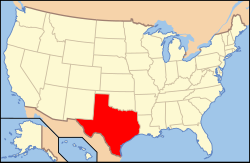Texas Prison System
| Texas Department of Criminal Justice | |
|---|---|

Logo of the Texas Department of Criminal Justice
|
|

Badge of the Texas Department of Criminal Justice
|
|
| Agency overview | |
| Formed | 1989 |
| Employees | 37,000 (2005) |
| Annual budget | $2.5 billion USD (2006) |
| Legal personality | Governmental: Government agency |
| Jurisdictional structure | |
| Operations jurisdiction* | State of Texas, USA |
 |
|
| Map of Texas Department of Criminal Justice's jurisdiction. | |
| Size | 261,797 square miles (678,050 km2) |
| Population | 24,326,974 (2008 est.) |
| General nature | |
| Operational structure | |
| Headquarters | BOT Complex, Huntsville |
| Agency executives |
|
| Website | |
| Texas Department of Criminal Justice Website | |
| Footnotes | |
| * Divisional agency: Division of the country, over which the agency has usual operational jurisdiction. | |
The Texas Department of Criminal Justice (TDCJ) is a department of the government of the U.S. state of Texas. The TDCJ is responsible for statewide criminal justice for adult offenders, including managing offenders in state prisons, state jails and private correctional facilities, funding and certain oversight of community supervision, and supervision of offenders released from prison on parole or mandatory supervision. The TDCJ operates the largest prison system in the United States.
The department has its headquarters in the BOT Complex in Huntsville and offices at the Price Daniel Sr. Building in Downtown Austin.
In 1848, the Texas Legislature passed "An Act to Establish a State Penitentiary", which created an oversight board to manage the treatment of convicts and administration of the penitentiaries. Land was acquired in Huntsville and Rusk for later facilities.
The prison system began as a single institution, located in Huntsville. A second prison facility, Rusk Penitentiary, began receiving convicts in January 1883. Before the Ruiz v. Estelle court case, the Texas Department of Corrections had 18 units, including 16 for males and 2 for females.
Various administrative changes where the organization of the managing board of the department occurred over the next one hundred years.
In 1921 George W. Dixon of The Prison Journal published a report on the Texas Prison System facilities. His article stated that the prisons were among the most "brutal" in the world. Dixon said that the prisons featured corporal punishment such as whipping, beatings, and isolation.
In 1989, the Texas Department of Criminal Justice and the Board of Criminal Justice were created. The Board is composed of nine members appointed by the governor with the advice and consent of the senate to six-year overlapping terms. This new agency absorbed functions of three state agencies; the Texas Department of Corrections, the Texas Board of Pardons and Paroles, and the Texas Adult Probation Commission.
...
Wikipedia
